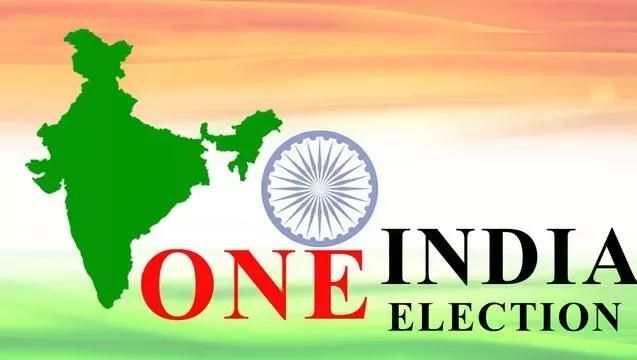(Image courtesy – Jagran Josh)
The concept of “One Nation One Election” (ONOE) has been a topic of considerable debate in Indian political circles. Advocates argue that synchronizing all elections – Lok Sabha, state assemblies, and local bodies – would bring numerous benefits, while opponents raise concerns about its feasibility and potential drawbacks. In this article, we delve into the pros and cons of implementing One Nation One Election in India.
Pros:
- Reduced Expenditure: Conducting multiple elections at different times is financially burdensome for both the government and political parties. ONOE would significantly reduce election-related expenses, including security arrangements, administrative costs, and campaigning expenses. This could lead to substantial savings, which could be redirected towards developmental projects.
- Administrative Efficiency: The current system of staggered elections disrupts governance as model code of conduct is enforced during election periods, hindering policy implementation and administrative decisions. With synchronized elections, governments can focus on governance without frequent interruptions, leading to better policy continuity and efficient administration.
- Voter Convenience: Simultaneous elections would alleviate voter fatigue caused by frequent trips to polling booths. It would also simplify the electoral process for voters, reducing confusion and increasing voter turnout. Additionally, voters won’t have to constantly engage in the election process, allowing them to concentrate on their daily lives and responsibilities.
- Enhanced Political Stability: ONOE could contribute to greater political stability by aligning state and national election cycles. This alignment would reduce the chances of mid-term elections due to coalition collapses or other political uncertainties, providing governments with a more stable tenure to implement their agendas and policies.
- Strengthened Federal Structure: A synchronized election cycle would reinforce the federal structure of India by promoting cooperative federalism. It would facilitate better coordination between the central and state governments, fostering a harmonious relationship and enabling collaborative efforts on national and regional issues

(Image courtesy – Firstpost)
Cons:
- Constitutional Amendments Required: Implementing ONOE necessitates significant constitutional amendments, including altering the terms of state assemblies and synchronizing them with the Lok Sabha elections. As per the recommendations of the Law Commission, it would necessitate at least five constitutional amendments: in Articles 83, 85, 172, 174, and 356. Such amendments require broad consensus among political parties, which may be challenging to achieve given the diversity of opinions and interests.
- Erosion of Regional Autonomy: Critics argue that ONOE could diminish the autonomy of states by subsuming state elections under the larger national narrative. States with distinct regional issues and identities may feel overshadowed by national politics, leading to a loss of representation and dilution of their unique concerns in the electoral process.
- Dominance of National Parties: Synchronizing elections may benefit national parties over regional ones, as they often have greater resources and reach. This could disadvantage regional parties, which play a crucial role in representing the interests of specific states or communities. Consequently, ONOE may weaken the pluralistic nature of Indian democracy.
- Logistical Challenges: India’s vast geographical expanse and diverse population pose logistical challenges in conducting simultaneous elections. Coordinating polling dates, ensuring adequate security, and managing electoral machinery across the country would require meticulous planning and infrastructure development, which may be resource-intensive and time-consuming.
- Risk of Presidentialization: Critics caution that ONOE could lead to the presidentialization of Indian politics, with elections becoming more focused on personalities rather than policies. This trend could further erode the parliamentary nature of Indian democracy, emphasizing individual leaders over collective decision-making and party ideologies.

(Image courtesy – Linkedin)
The idea of One Nation One Election in India is a complex proposition with both potential benefits and drawbacks. While proponents emphasize the financial savings, administrative efficiency, and political stability it could bring, opponents raise concerns about constitutional amendments, erosion of regional autonomy, and logistical challenges. Ultimately, any decision regarding ONOE must carefully consider its implications for Indian democracy, governance, and federalism, ensuring that it serves the best interests of the nation and its diverse populace.

